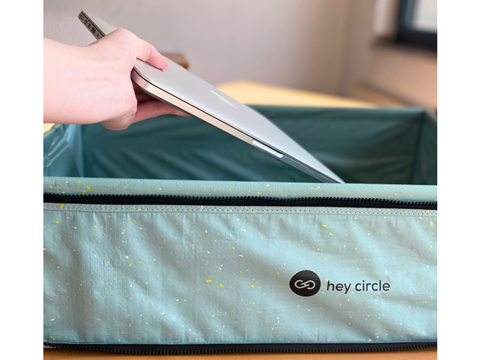
Interzero has announced it will be utilizing reusable boxes from German startup hey circle in an effort to reduce waste and save CO2 emissions in package shipping.
Interzero says it refurbishes approximately 300,000 used IT and communication devices every year. Since early 2023, Interzero has been using hey circle’s reusable shipping boxes for the return and shipment of smartphones, tablets, and hard drives.
The company handles the entire refurbishment process from purchase to reuse, and hopes to save further resources by using hey circle’s reusable shipping solution. Interzero uses hey circle L and XL boxes, which feature a patented folding technique and a fully enclosed design with theft protection.
The boxes are designed for 50 cycles, tested for a stacking pressure of 150 kg, and can be loaded with up to 12 and 15 kg respectively. The CO2 savings have been determined by the independent environmental consultancy Ökopol.
“Conserving resources and reducing CO2 emissions – this is precisely the approach that connects Interzero and hey circle. Not only is the decision for reusable packaging good for the environmental balance – depending on the case, costs can also be saved, and a marketing effect can be achieved,” says Doris Diebold, managing director of hey circle.
In similar news, Returnity announced that apparel company Vuori will use the company’s Last Box - a reusable shipping box that apparently lowers the economic, operational and environmental impact of a retailer’s inventory fulfilment - for merchandise shipments to its U.S. retail stores to replace conventional cardboard boxes. Returnity states the product will cut packaging, lower operational costs and reduce box unpacking labour by 50%.
A new application system was recently launched by Baumer hhs that sprays an anti-slip hot melt adhesive onto transport and shipping boxes to secure them in transit – a move set to reduce plastic film consumption and packaging waste. The solution is thought to be especially beneficial for in-house transports, apparently negating the need for any pallet wrap in many cases.
If you liked this story, you might also enjoy:
How are the top brands progressing on packaging sustainability?
The ultimate guide to global plastic sustainability regulation













No comments yet